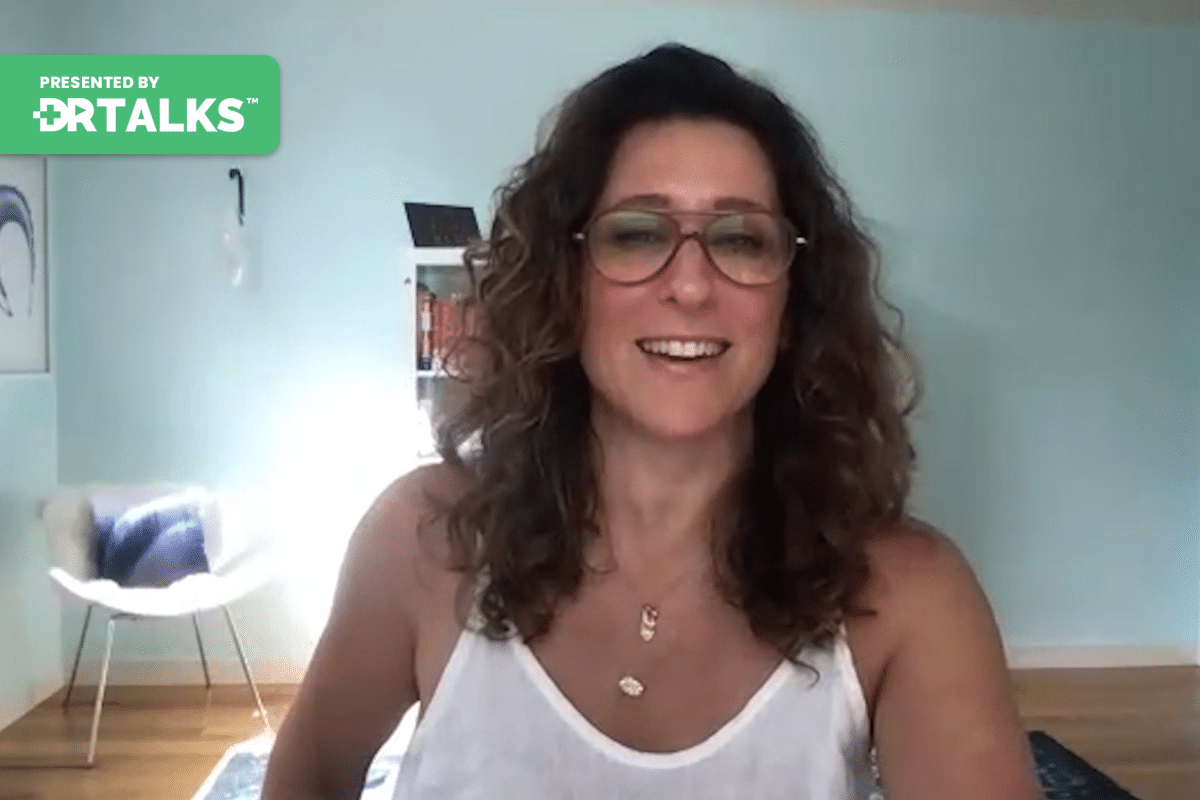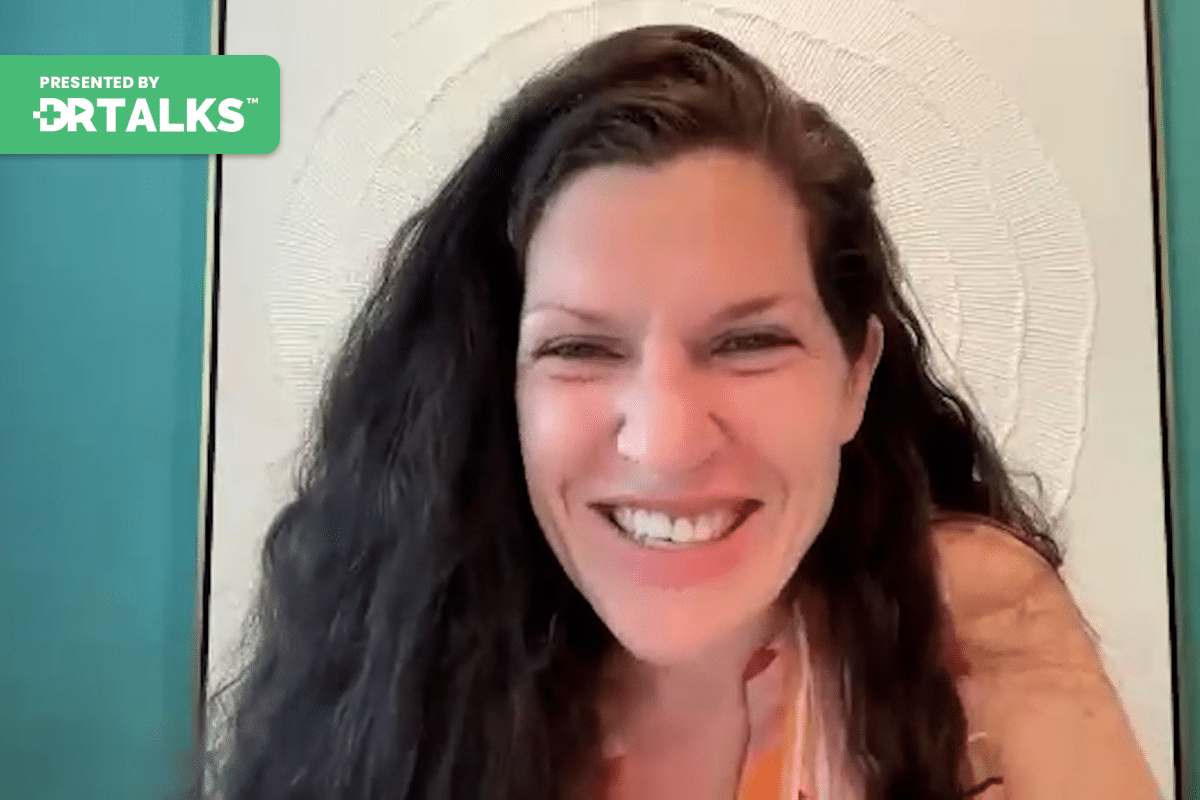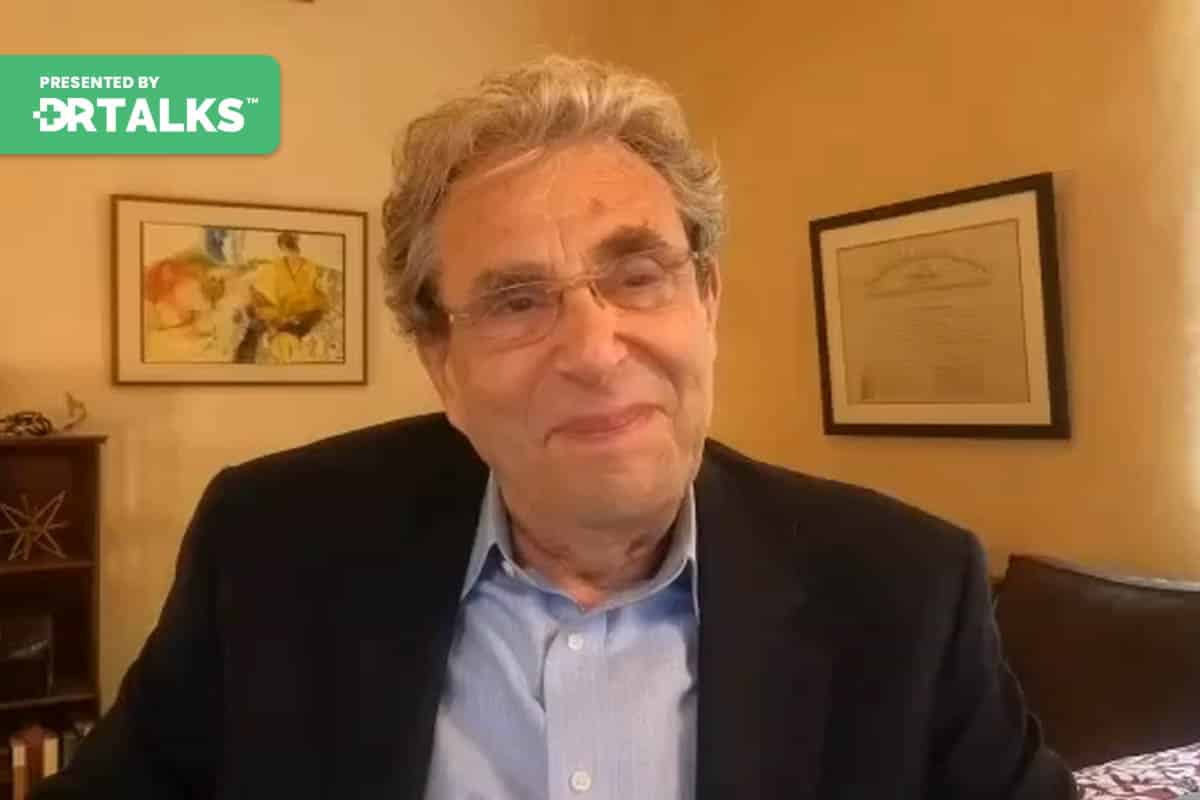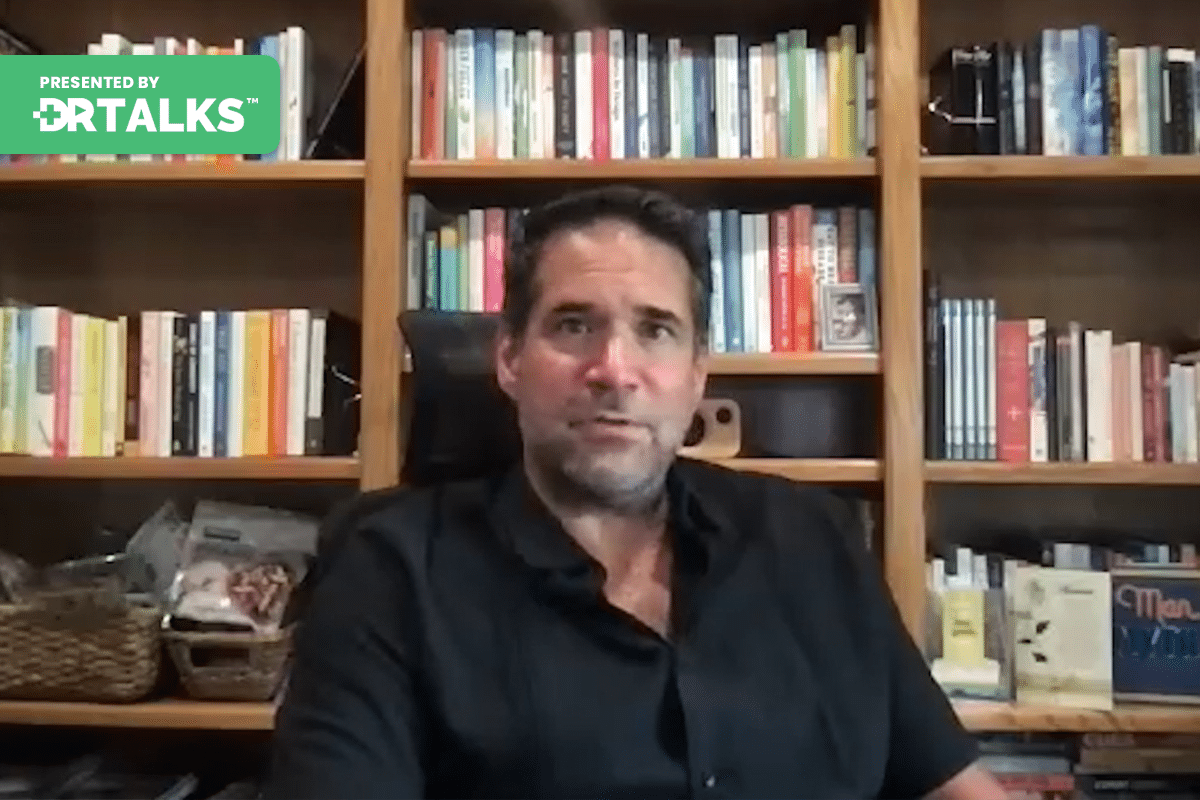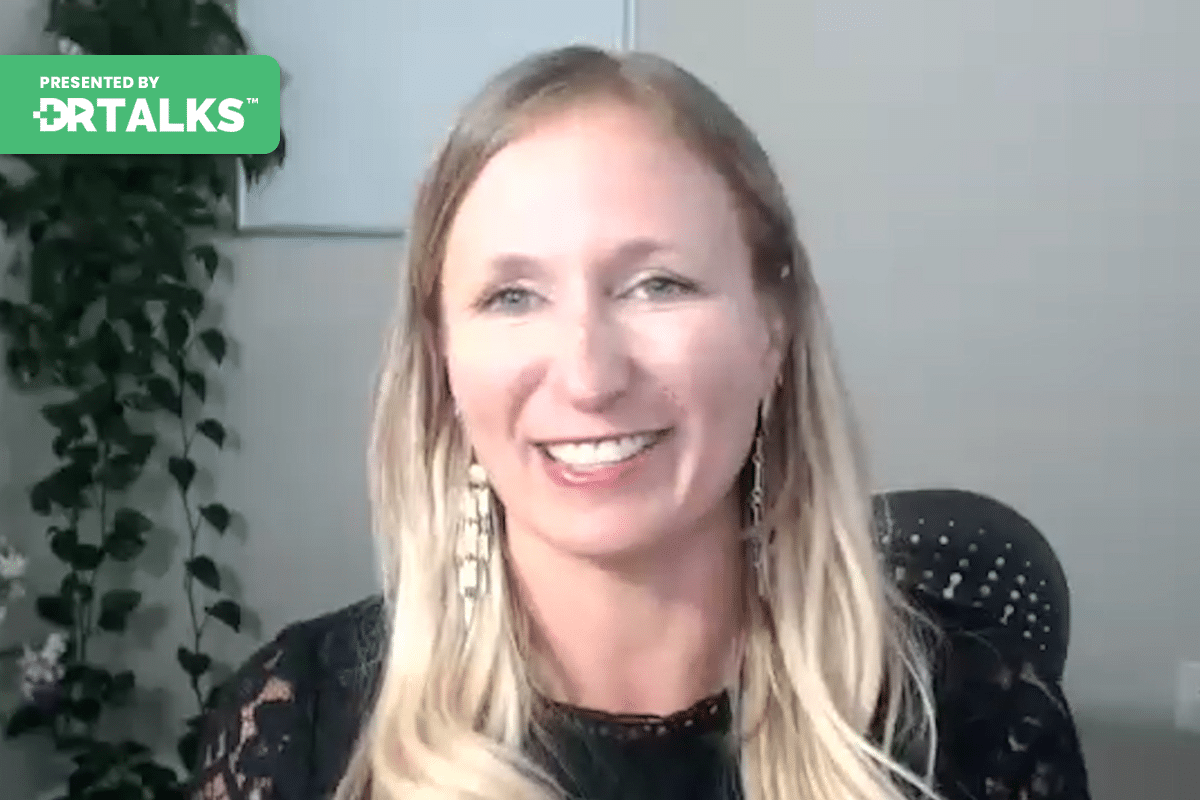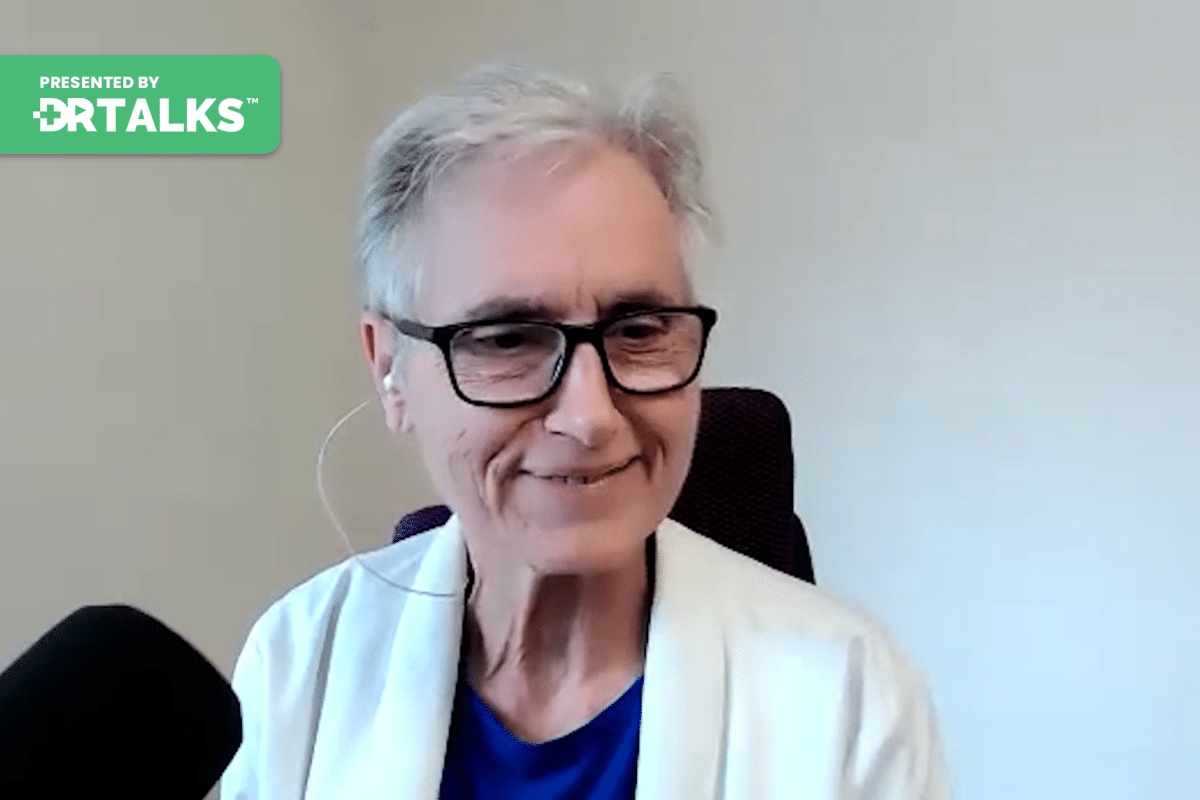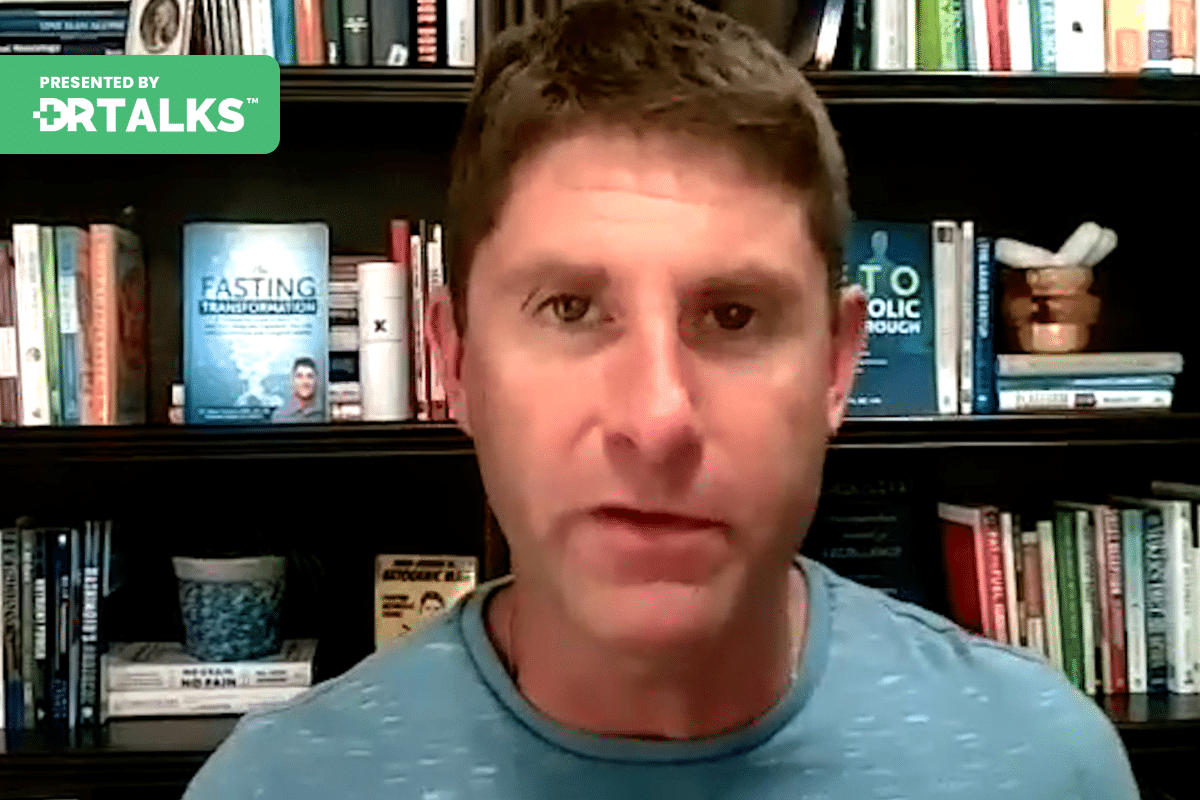Join the discussion below
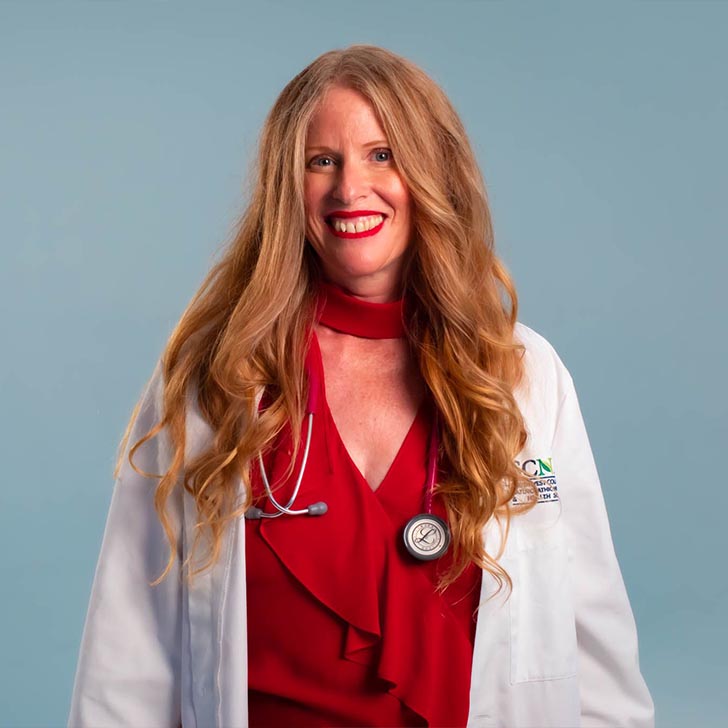
Dr. Sharon Stills, a licensed Naturopathic Medical Doctor with over two decades of dedicated service in transforming women’s health has been a guiding light for perimenopausal and menopausal women, empowering them to reinvent, explore, and rediscover their vitality and zest for life. Her pioneering RED Hot Sexy Meno(pause) Program encapsulates... Read More
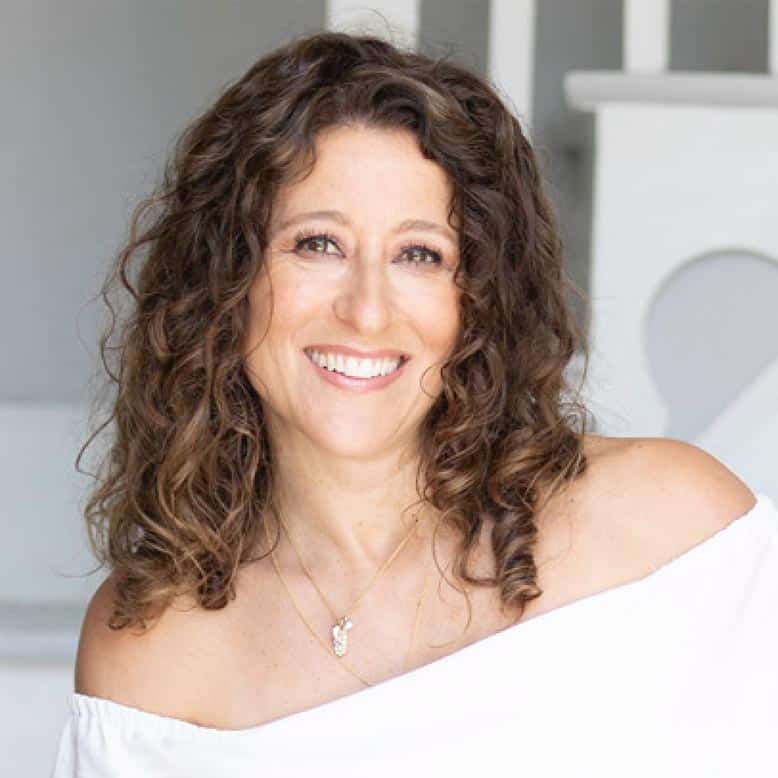
Esther Blum, MS, RD, CDN, CNS is an Integrative Dietitian and Menopause Expert. In the past 27 years, she has helped thousands of women master menopause through nutrition, hormones, and self-advocacy. Esther is the bestselling author of "See ya later, Ovulator!", "Cavewomen Don’t Get Fat", "Eat, Drink and Be Gorgeous",... Read More
- Learn how women can navigate menopause confidently with the right tests, supplements, and exercises
- Understand what the “menopot” is and how to lose it
- Discover the benefits and safety of hormone replacement therapy (HRT)
Related Topics
Advocacy, Boundaries, Breathing, Diet, Emotional Health, Gaslighting, Healing, Hormone Health, Hormones, Lifestyle, Medical Research, Meditation, Menopause, Mindfulness, Nutrition, Perspective, Resiliency, Stress Management, Supplements, TraumaSharon Stills, ND
Hi, ladies. Welcome back to Mastering Your Menopause Transition. I am still your host, Dr. Sharon Stills. And as always, I am excited to be here with you. Super excited. I have got a rock star for you. I told you I would go all over and find you the best of the best. And you are not going to be disappointed because my guest, Esther Blum, wrote the book “See ya later, Ovulator!” And when I saw that, I was telling her before we came live, I was like, I need to know you; I need to be friends with you. Anyone who writes that title is someone who is part of my tribe and our tribe here, and that it is just fantastic.
Esther Blum has been at this for over 27 years. She is an integrative dietitian and menopause expert. She has written many books. And she is also Gwyneth Paltrow’s menopause mentor. She has been in Forbes, ABC, and all the places all the things. She has good things to say. Everyone wants to hear her, and now I have got her here for you. We are going to have a real fun conversation about “See ya later, Ovulator!”
Esther Blum, MS, RD, CDN, CNS
I am not going to hold up the cover, there we go “See ya later, Ovulator!”
Sharon Stills, ND
Well, welcome to the summit, Esther.
Esther Blum, MS, RD, CDN, CNS
Thank you. Thank you for having me. From one New Yorker to another. Good to be reunited.
Sharon Stills, ND
Yes. We are like sisters divided at birth and reunited right here live on the summit. I always start by asking, why menopause, why menopause expert, how did this find you or you find us?
Esther Blum, MS, RD, CDN, CNS
Definitely. The women found me. I mean, I worked in hospitals for the first five years of my career. I was a clinical dietitian and then knew that I really was not making a difference by giving people 10 minutes of diet instruction after they had a heart attack and never seeing them again—no continuity, no follow-ups, no implementation. I got trained in functional medicine and then opened work for a functional doctor, but I also had a concurrent private practice, and like, menopausal women walked in the door, and I was like, gosh, I am in my 20s; How am I going to figure this out? I started working with comprehensive diet therapy, and then, as time went on, I really saw the huge gap in medical care for women in menopause and the ultimate gaslighting. That’s why the back of my book has a little banner like Gaslight Free Zone because, women are horribly gaslit and they go to the GYM office and are offered, they will say, Wow, I think it is my hormones; I feel I am sweating at night, and gosh, I have no libido, and like sex is kind of painful, and my memory is really changing, and I am having these crime scene periods, well, I think it is my hormones, and doctors are like, No, that is not your hormones; here is an antidepressant, though, for the hot flushes, or they are like, Well, here is the pill or an IUD or they are just told like, no, that is just the way it is, but it is not your hormones.
And, please, we are the most intuitive creatures; we know when our period is off by an hour, we know when we have gained weight without looking in the mirror, we know when our boobs are sore, we know when things are off, so do not tell us it is all in our heads or to have a glass of wine every night, which will actually make it worse. That is why I had what I call meno-rage. And I was like, This is my book, I tell you; this is my fifth book. The download came to me. I was sitting there on the couch with my husband with a Lycopod and literally had the whole outline written in five minutes for the book, and I was like, Well, I think it is here; we are ready to write this sucker. And it flowed through because all I was doing was picturing every woman in front of me telling me her horrible stories or her challenges or crying because she is so exhausted from being up all night and did not know why, and with no solutions in sight, I was like, I am a creative solution and give women a Bible and stuff it with enough research studies to make it legit so women can give this to their doctor, they can give it to their nurse practitioner, and they can have their husbands read it also to help us understand what we are all going through. And no, ladies, it is not in your head, and yes, you can have solutions. And you can get through this and be vibrant and your absolute best self.
Sharon Stills, ND
Absolutely. It is funny because I too, when I opened my practice, I was in my early 30s, and it was right when Suzanne Somer’s book had come out, and I had all these menopausal women, and I was like, I got to figure this out for them. But I was so young at the time. And now I feel like I am post-menopausal now and now you are my people. But it is such a, from my perspective, it is like, I know this can be a beautiful time; I have seen it for 20 years working with women aging backward and feeling great, and what you say is that it is one of the biggest gaslighting events in the medical experience for women. I mean, women are traditionally not really put into the medical research anyway, and that is a whole other topic, but certainly, with menopause and just the things you were saying, it is infuriating that this is how women are treated. And I know that some of you watching, and this is why I do this summit, are still being treated like that, and we are here to tell you there is definitely another way. I have not read your book yet; I am just falling in love with you and your title, but I have not read it yet. I am kind of just curious: what do you want to talk about from there?
Esther Blum, MS, RD, CDN, CNS
Yes. Well, first of all, I really go into opening the kimono on what I teach women in practice; these are everyday reality Barbie things that you can do to start feeling better immediately. We talk about diet, we talk about supplements, we talk about how to fire your doctor or find a new one, self-advocacy, and I do talk about hormones, testing, and treatment. I feel like we should get started with diet and lifestyle. Because you can never out-hormone or out-supplement your lifestyle. If you have untreated trauma, which I see a lot of women get Hashimoto’s from untreated trauma, if you have got a lot of stress, you are in a bad marriage, you struggled with parental relationships, you are raising kids, you are going to have to learn to really cultivate and coach your mindset and your stress management. That is foundational. I was just doing an interview for women with Hashimoto’s, and they said, Gosh, do we start with hormones, do we start with diet, do we start with supplements? And I said, No, you start with what is up here in your head because your thoughts, your brain, and your stress drive hormones from the top down. And we often become less resilient in menopause when it is time for us to increase and improve our resiliency.
First and foremost, the emotional pieces, the stress management. Really think about who you are surrounding yourself with; that is tip number one because you want people who are going to be loving, supportive, and who want to see you grow into your highest self. I always surround myself with people who are way wealthier, way more successful, and way more emotionally balanced. I am pretty balanced emotionally, but people who have done the work on themselves are the people I want to learn from those are the people I want to be around. And it has been very interesting because I really have released relationships. I look very closely; it is like I almost do an annual check-in like who is in and who is out. When the bleep hits the fan, I do not know if I can curse here, but when the stuff hits the fan, who shows up in your life, how do they show up, and how are you showing up for them? It is really important that you do an inventory.
Sharon Stills, ND
I love that. I do that too; I go through my phone and look at who is in it and if they need to be deleted, and when I was just thinking, I just recently did is like: who shows up only when I am having troubles because they are really invested in drama, or who shows up when I have something to celebrate and then they are not that interested? And I love what you are saying: surround yourself with women and men who want to see you grow, who celebrate your wins, and who are not trying to push you down.
Esther Blum, MS, RD, CDN, CNS
Yes, we are mentally healthy, the ones who can show up for the weddings and the funerals, or the other. And it is okay; it is really healthy to create clean and loving boundaries. And sometimes the most loving thing you can do is let someone go for their sake too; it will help them grow too. That step one, meditation, also falls in there. Meditation is life-changing. I worked a couple—I mean, I had for many years, but I have healed from Lyme and mold. And my doctor, who was Tom Moorcroft, is like one of my favorite humans on earth, and he was like you; he started a meditation course, so I totally was like the first sign up, and he was like, You have to imagine yourself; you have to envision yourself perfectly healthy and radiantly healthy, and like what you want your forward future self to be, and your subconscious in your body will totally catch up. And he had recovered through Lyme, mostly through meditation. Yes, herbs and all that. And of course, I got rid of all my Lyme molds like feel better than I felt in so many years. But what the meditation has done for me has just brought me again to.
And we do this with our own patients too, like brings you to just a place of healing, peace, perspective, and learning to respond to things and start to react to things right. Because midlife is really intense, we have aging parents or parents who pass; we have got teenagers who are maybe college bound; some of us may start to have kids who are all grown and flown at this point; some of us even have like younger kids; but either way, we are in the same stress situation. You have to learn to deal with your stress in a way that is other than alcohol or drugs, or not that some people, do not like psychedelics, or as my son calls it, the devil’s lettuce. That is okay if that is your boat. But you really got to dig deep and really get grounded with some good meditation. There are apps; Insight Timer has like bazillions of free meditations. Breathing, you do not have to be good at it. No one ever wins meditation; it is just returning to your breath and cultivating a practice where you take time out of your day to breathe for 10 minutes. That is all it really is at the end of the day.
Sharon Stills, ND
It is like Zinn saying, If you are sitting here thinking, I do not have time for 10 minutes to meditate, then you need to meditate for an hour, like we look at our time. And yes, meditation is medicine. I say it all the time. And I will just give a shout-out here for my love, which is MBSR, which is mindfulness-based stress reduction, which is the work that Jon Kaabat-Zinn did, which I fell into just in the right place at the right time when I had started medical school and learned about this. And it is an eight-week course; you can Google it; they are online now; and you can go to one in person, but they are all over the place.
And it is an eight-week course that will teach you about mindfulness and meditation, and how to be present in your life. And it is a game changer and very user-friendly. Because, like Esther says, we are not meditating to win; there are no gold stars; it is a practice; it is an unfolding event. And if you are thinking, I am not good at meditation, that is okay; no one is good at it. It is about returning.
Esther Blum, MS, RD, CDN, CNS
That should be the title of the next book. Everyone Sucks at Meditation at First. The first thing you need to know is it takes a minimum of 56 days—this is less than eight weeks, but it takes a minimum of that—to change the fight or flight response in your brain. Do not think that you are going to meditate once and conquer the world; no, but what you will do is, in time that the results are: cumulative, and you retrain your brain to think positively, to welcome things in, to think creatively, problem solve, and all of those things are possible for you. Pull in a partner; pull in the universe.
Sharon Stills, ND
Cleaning up, relationships, meditation. What is next?
Esther Blum, MS, RD, CDN, CNS
The next, I really love to start with diet. Because diet is—believe me, I am a supplement slut, but a diet. You have got to earn your supplements; you really do, and you cannot ever think they are going to take the place of what eating nutrient-dense foods can do. And the thing is, not only do foods have to be nutrient-dense, but we also have to think about how we are nourishing our bodies in premenopause and menopause because this is the time in life when we are losing the greatest amount of muscle mass in the shortest amount of time. With the decline in progesterone, estrogen, testosterone, and DHEA, we are going to see a loss in muscle mass, we are going to see creepier skin, we are going to see more cellulite if we do not really make sure we optimize our protein intake. That is the Meno Law number—I mean, Esther’s Meno Law for fat loss. But really, for optimization is optimize your protein intake. What does that mean? It really is not what the RDA says, and I am a trained dietitian, and the recommended dietary alliances, allowances, pardon me, are the minimum amount you need to prevent sickness and death. That is not optimization. Most people are eating the equivalent of what my dialysis patients in the hospital were eating.
Okay, that is how I roast my patients. I am like, Yes, well, you have the protein intake of a dialysis patient. I am like, Of course you feel exhausted; of course you have brain fog; of course you are not sleeping; of course you are gaining weight and feeling lumpy, dumpy, and frumpy; you have got to have your protein; those needs are going to shift. And you will know this because what worked great for you in your 20s, which was probably a starvation diet to lose 5 pounds before you hit the Hampton’s now. That is going to crash and burn, and you are just going to lose muscle and look old. One gram per pound of your ideal body weight is key. For a woman, if you are five feet tall, 100 pounds is your baseline, and you add 5 pounds for each additional inch; if you are five feet three, 115 pounds is your ideal to 125, 130; if you are five feet five, 125 pounds, give or take, somewhere in that area. In real life, that means most women need four to six ounces of protein at least three meals a day, or if you are intermittent fasting, you need at least seven or eight ounces of protein at two meals a day. It really depends. And we need to evenly distribute our protein intake throughout the day. Do not think having an egg at breakfast, a three-ounce can of tuna at lunch, and then a steak at dinner is going to cut it. No, you need to have two eggs and two pieces of smoked salmon or turkey, then you need to have four to six ounces of salmon or tuna at lunch and four to six ounces of chicken or steak at dinner. You really do have to rack out your protein intake. Lifting weights is also really important.
Sharon Stills, ND
I just want to ask you a question before we move on. What are women supposed to bring? What do you think with their carbs than their healthy fats? Could you just explain what a whole plate to look like for them?
Esther Blum, MS, RD, CDN, CNS
Yes. Well, that is my Meno Law number two: is to flip your ratios of carbs to fats. Most women come to me again, having avocado toast for breakfast, or a bowl of oats, or a banana, because we are running out the door, are super busy. And the train continues throughout the day; they went snacking all day; they are not really sitting down for meals, so their carbs really outweigh protein. Flipping those ranges, if somebody, let us say, your ideal body weight is 120, if you can get at least 100 to ideally 120 grams of protein a day, great, and like 100 grams of carbs a day, that would be great. You are flipping; you are going from higher carb, lower protein, to higher protein, lower carb.
This would mean, your meals should be, your carbs really should be. For getting protein at every meal, I would say have a cup of fruit with breakfast, and then lunch can be a lot of protein and veggies. And then dinner—this is Meno Law number three—I like women to have a cup of starch at dinner because that gives a slight bump in insulin, which tamps down cortisol and your stress hormone, and it optimizes sleep. Cup of fruit in the morning, a cup of starch at night from sweet potatoes, you can do white potatoes, quinoa; if you do butternut or acorn squash, you could do a cup and a half because that is really pretty low carb; an ear and a half of corn; corn is not terrifically high carb; a cup of peas; legumes if you tolerate; if you tolerate rice, that is fine. That is really how I have women structure their days. Now, if you are having thyroid issues if you are having a lot of Hashimoto’s, you want to play with your carbs, not be too low on carbs. You may be someone who feels better with carbs at every meal because carbs do upregulate T4 to T3, so you will have more energy and better fat loss results. And if you are working out really hard in your strength training, eat to fuel your workouts. If someone is really lean and lifting heavy, I will have them have a couple of spoons of honey and salt on rice cakes before or after their workouts. They really need the extra carbs food to refuel glycogen and just not crash after. That is what the beauty of lifting weights is like. I love lifting heavy because then you really earn your carbs and you could stay lean.
Sharon Stills, ND
That is right. You get to eat your honey.
Esther Blum, MS, RD, CDN, CNS
You get to eat your honey, yes. I love honey, I have some every day, I love it.
Sharon Stills, ND
Yes, I love Manuka honey, I am a big fan. It is got so many benefits from.
Esther Blum, MS, RD, CDN, CNS
So many benefits.
Sharon Stills, ND
Healing. And awesome. Okay. We are on Meno Laws, how many Meno Laws do you have?
Esther Blum, MS, RD, CDN, CNS
That is, only three. I keep it simple. High protein throughout the day in even amounts; protein is higher than carbs. If you do not know what you are eating looks like, Check it, go to, like, MyFitnessPal, sign up for a free account on Cronometer, or just log your food for three days, and you are going to be like, wow, you are going to know real quick. Okay. And then have some carbs at night with dinner. Have a good bomb of starch with your dinner.
Sharon Stills, ND
That is really easy. Everyone listening: that is really easy to follow; it is very succinct. And I love the tracking. Because I have seen this in practice, someone comes in, and I take them, What is your diet? I eat a ton of vegetables, blah-blah-blah, and then I say, Well, do a diet diary, and then in seven days you see they ate one vegetable. Often, what we think we are doing is not actually what we are doing, and the power of writing things down and being honest, knowing you are writing it down, so now you are going to behave. Write down what you are doing so you can really take a look at it and see where you can start implementing these changes.
.
Esther Blum, MS, RD, CDN, CNS
Totally. If you bite it, you write it. I am a lot more accountable when I know I have to log versus when I am not, and then things sneak in—the chocolate sneaks in, or just the bigger portion sizes can sneak in. If you notice like, pants are a little tight lately, like, Okay, start logging. It is the greatest form of cognitive-behavioral therapy, and it is very nonjudgmental. It is like you are either over your numbers or you are meeting them, or you are below. It is so clear-cut that there is no judgment; it is just facts.
Sharon Stills, ND
It is true. Like you eat something sweet, and you have a little treat by the time you go through the afternoon and six o’clock rolls around. If you are stressed, you could easily be reaching for something else sweet, totally forgetting that you ate something at noon because that seems like it was seven days ago, and when you are writing it down, you can look and be like, Wow, I have not or I already had a little treat. I better watch my protein and my healthy fats, and so forth. It is such that I can write everything from what you are doing with your day, time management. I feel like the calendar and just writing it down is one of your biggest tools just so you could be figuring out what you are doing in your life, tracking, putting in your exercise time, your meditation time, your sleep time—all these things that should be non-negotiables. Alright. Well, I love that. Let us move on. We have got diet, and then you wanted to talk about supplements.
Esther Blum, MS, RD, CDN, CNS
Yes. Supplements can also be really helpful. Okay, there are so many reasons why. Often, and this is so surprising for women to hear, I treat a lot of women who are actually estrogen-dominant, even in menopause. I do their hormone tests, and I will look at a DUTCH test, and they are just not moving estrogen through the liver. Why is this important? Because if you go on hormone replacement and your liver or your gut is not eliminating estrogen well or moving it through, moving it down the right pathways, you can experience side effects on hormones where you do not feel well, you are irritable, you are gaining weight, you are feeling like your boobs are sore, you can really not feel well, or, God forbid, you put yourself at risk for hormone-dependent cancers. Again, I really do not like using that word; it is quite scary, especially because bioidentical hormones are given in microdoses, but they are still hormones, so you do want to really check.
I love making sure everyone is moving their hormones through quicker. At times, I will give a cruciferous concentrate that can help your liver move it down the right pathways, move your, in particular your 4-OH or 16-OH estrogen, down the right pathways. Other times I will get DIM, which is Diindolylmethane; please do not supplement this on your own, people; work with a practitioner. Like, it is not, Oprah: like, you get a DIM, and you get a DIM, and you get a DIM. You really have to work with someone who knows what they are doing and is very specific in your treatment. But I do love glutathione for women as well. Glutathione is so wonderful. Most women, when I test they are deficient in glutathione, which is the liver’s most important antioxidant. Around the time of this recording, New York City was orange because the wildfires in Canada were really real. I live 50 miles north of New York, and my lungs were feeling it, and my air filter was going off like crazy. There is air pollution. We are also affected, again, if you are taking hormones, if you are getting exposed to pesticides from foods, if you are very low on energy and exhausted all the time, or if you have got chronic Lyme or mold. Glutathione is really it is a sponge; it is a very powerful antioxidant, which is amazing for longevity and health.
I also love magnesium glycinate in the evenings because this is a particular form of magnesium that addresses anxiety with the natural decline in progesterone. Why is progesterone dropped? Because it is your body’s way of saying, Hey, lady, you are in your 50s; it is really not time for you to have a baby anymore, we are going to wrap that show up with declining progesterone, estrogen, and testosterone, and eventually you can really experience a lot of anxiety and a lot of depression. And people do not talk about that doctors will prescribe antidepressants; more gaslighting right there. And with antidepressants, there is clinical research to show they help quell hot flashes to a degree, but that does not mean it is going to address your progesterone deficiency. And the pill and the IUD have synthetic progestins; they do not have the same biochemical benefits as biological progesterone. It helps make GABA in the brain; it gives you a very calming sense of peace; it really quells anxiety; it helps you sleep; and it helps quell irritability. But magnesium is really important as well; it is a nutrient that is missing in our soils; we are very low and depleted. And magnesium glycinate is wonderful and also helps with bowel irregularity. It is responsible for about 400 biochemical reactions in our body, including blood, sugar, relaxation, and sleep. I like to give it along with it; if somebody needs progesterone, I send them to their doctor for that. But magnesium is a great starting point too.
Sharon Stills, ND
Yeah. Really fits into a parasympathetic magnesium helping does in your parasympathetic minerals. And yes, I am absolutely, you want to work with someone. And it is really important listening to me. I do 24-hour urine testing on all my patients. And you want to be working with someone who is testing that way, who is looking at the metabolites like Esther was talking about, so that you are doing safe bioidentical hormone replacement. I have seen patients come in who were totally overdosed and who were never monitored, and it does can put you at risk. It is not that bioidentical hormones are dangerous; it is just the improper use of them, or monitoring, or application of them can become dangerous. But when used in the right hands, they can really be a beautiful part of your transition.
And yes. I know the orange sky, and that was so profoundly in the phases, but we are living in a toxic world, so we need to be thinking about antioxidants like glutathione all the time. I mean, I live now mainly in Scottsdale, which is a suburb of Phoenix, and I go out, I go to the store, whatever I am doing, I do not realize it, but then I go hiking and I go climb a mountain, and then I look at the city, and it is like this thick. Phoenix is one of the most polluted cities in the country. Yes, it is the way the mountains are formed; they kind of trapped the pollution in Phoenix, which is, I think, the fifth biggest city now, and you can just see it. And it always reminds me like there is all these invisible things, and just because you cannot see the toxins does not mean they are there, and you want to be not going crazy—not like freaking out, but just being informed and taking steps like having some good glutathione on board—which is so super important. Okay. Diet, supplements, not lifestyle.
Esther Blum, MS, RD, CDN, CNS
Can we talk about sleep?
Sharon Stills, ND
Yes, please.
Esther Blum, MS, RD, CDN, CNS
My gosh. It is really important that we get back to our roots when it comes to being cavewomen or cavemen. If you are listening, it is really important. My husband teases me that I am an incandescent girl in an LED world. It is getting harder and harder to find incandescent bulbs. I do recommend you use a dimmer, no matter what light bulb you have use dimmers, and keep your lights low in the bedroom. I have colleagues that put in only red light bulbs or amber light bulbs in the bedroom lamps that they use in the evenings. You can get glasses with blue light-blocking lenses, or you can also even adjust if you are not in love with devices in bed, but let us say you do have a device. Please, we all do. Let us be clear. I make mine really dark; in the evening it is almost all the light is gone. It is the dimmest setting that it can be, and my melatonin is excellent; I have had it tested. Taking care to also not sleep with your phone next to your head, if you need an alarm, use a battery-operated clock like old school, and if you need to have your alarm on like you have a teenager or a parent who calls in case of emergency, just keep it like ten feet from your head. Do not sleep with it next to your head; do not forget; we forget. We do not even know the phone; the 5G technology is military grade, that is like for picking up missiles overseas. That is not supposed to be next to our heads; it is not supposed to be in our pants, in our pockets, near our reproductive organs; it is not supposed to be in our bra, near our breasts; just keep it away. I am constantly working with my son on that, like, if you want to reproduce, do not put your phone in your pocket, and I set up chargers far away from his bed.
Some of my family members turn off their routers at night in the house too; that is a good idea. You figure out what works for you. But really prioritize your sleep. And the best your body does the most healing between 10 p.m. and 2 a.m. Or if you are a night shift worker, your body heals most between 10 a.m. and 2 p.m. That cycle, that 10 to 2, is when you regenerate, you heal, you make the most growth hormone that is going to boost muscle production, you are making melatonin, you are healing inflammation, and you are optimized in your blood sugar. I see a lot of adrenal dysfunction and a lot of blood sugar dysregulation from poor sleep. I see women with really flatline cortisol curves, or their cortisol is sky high in the morning and then crashes hard by 3 p.m. hard, and then they are gaining all this weight without changing their eating habits. Just two weeks of poor sleep can cause a tremendous amount of insulin dysregulation. But the good news is, of course, correcting sleep with diet and supplements, and if you need hormones, like layering on, but again, it has to start with lifestyle. Some women are also really are very deficient in melatonin. Look at your lifestyle; if you are deficient in melatonin, you can supplement. Again, I have seen melatonin and sleep improve just by changing your phone habits at night. You may not truly be deficient in melatonin; you may just need to clean up your habits.
But either way, prioritizing your sleep can really correct your blood sugar, and of course, exercise too. All of that is really important. And if you are not sleeping well, if you are hot flashing through the night, if you are up at two or three and you are up for like an hour or two, you can fall back asleep till four or five, and this is not just a one-off thing. If you notice it starts in perimenopause also your sleep is worsening before your period, that is a sign like, Okay, my progesterone is dropping. If you are in early perimenopause, often there is often an herb called chaste tree or vitex that can raise your progesterone, and you can certainly benefit from that. But if you have late-stage perimenopause, I have a lot of women who go to the doctor and they get a prescription for progesterone, and they may take it just the second half of the month in the luteal phase, or if their progesterone is low enough, they just start taking it all month long. And just by correcting a woman’s sleep you change the world, man, you change the world.
Sharon Stills, ND
Many of their husbands sent me flowers after I gave their wives bioidentical progesterone because it is nature’s, it is your hormonal anti-anxiety, and like you said, it is such a game changer. And you have to sleep; you have to be sleeping. We cannot even discuss why you are tired or why you are gaining weight if you are not sleeping. Foundational things, and now is the time. I remember when I was in my 20s, I thought I was super cool that I could get by on four hours of sleep, and by the time I was in my late 20s, my adrenals were like, I fooled you. Sometimes our society has kind of taught us to do-do, produce-produce, and we are here to say chill, relax, breathe, love yourself, have boundaries, and sleep.
Sleep is a non-negotiable for me, even when I was younger, in medical school, and raising two kids, and I did not have the time I have now to do all the self-care I do. Eight hours of sleep were non-negotiable. I had to get my sleep; you just cannot function. If you are worried about brain fog and all these things and you are not sleeping, then you do not, like what you said in the beginning, you are not going to out-supplement your diet or your lifestyle choices. And supplements, as it says, they are supplements; they supplement the lifestyle. I, too, am a supplement slut. I am like, when I pack, I am on vacation right now. Packing clothes literally takes me like two and a half minutes; it is like, Boom, boom, boom. But packing my supplements—that is a seven-day. We have got to start ahead of time. That is a big deal. I am all for supplements, especially since, like you said, the magnesium is depleted, and a lot of things are depleted: the toxins, the orange skies, the skies that have orange things in them that we might not even be seeing and that we are breathing. It is really this multifactorial way of healing. I have to ask you one more question because you have a term. And I love your term: Menopot.
Esther Blum, MS, RD, CDN, CNS
The Menopot, yes. Prior to perimenopause, you just naturally have an hourglass figure, you have flexibility in your eating, you do not have to dial in so much in your diet, you want to cut a couple of pounds, you exercise a little more and cut your calories back, and you do not have to worry about ratios of your macronutrients. Once you start hitting perimenopause, your estrogen is going to, you will have surges. That is where I get my Meno-rage from is the estrogen surges. And coupled with declining progesterone, testosterone, and DHEA, that is a recipe for a cortisol belly. Which is your cortisol and your insulin becomes far less regulated, you can have blood sugar imbalances, you can wake up hungry in the middle of the night, or when your liver is trying to detox alcohol, your cortisol is going to go up, and you are going to be like, wide awake at three in the morning. As a result of all of those factors, you are going to store excess calories or excess cortisol around excess carbs around your midsection as bloat or fat, and really, your muffin top can turn into a cake top, or you have a muffin top now that you have never had before. The other thing you want to take into account, though, are our digestive changes. We have a microbiome, which houses trillions of beneficial bacteria in and around our small intestine. There is a subset of those bacteria called the estrobolome, and those help to metabolize your estrogen. When you detox your estrogen, you are not reabsorbing it and recycling it; instead, you are detoxing it and excreting it through your bowel movements. When you go through perimenopause and when there is a decline in hormones, the beautiful mucous lining of your small intestine changes, and you can get intestinal permeability, you can get a leaky gut, can be more prone to GI infection, and your production of hydrochloric acid can decrease as a result. That can also contribute to that meno-bloat by not tolerating foods, especially gluten and dairy, as well as you did, or not tolerating booze so well, or like gaining a couple of pounds just from a glass or two of wine. All of those factors fall into play. Now, again, can you correct that? Yes. Number one: diet. We know our diet tactics now—our Meno Laws for weight loss. We know that sleep hygiene really counts.
Now I want to talk about movements. Because again, the movements we did in our 20s and a lot of us now in midlife, like aerobics were big, Snackwells cookies were big. I mean, I am really dating myself here; fat-free junk, aerobic exercise, and weightlifting was not really in so much. And now a lot of people, like during the pandemic, have bought Pelotons and are doing this super-high-intensity cardio and then crashing. Listen, if you are still running marathons and you feel amazing, by all means, go for it. I am not here to take that away from you. But most of the women that I see and I am sure you see too, Dr. Sharon, the resilience is lower, we are more tired; we do not have the bandwidth to sit and grind out a four-mile run; we are just not, we are like slogging through it. Most of us feel better when we are walking. Walking is the most underrated fat-burning activity on the planet. If you walk four to six miles a day, you are going to stay lean every single day and not gain weight; you are going to offset that weight gain. Number one, it can be aerobic, especially if you live in a hilly area or you have a treadmill. If you put the heel setting on, you can absolutely get your heart rate up, but it is wonderful. You are ideally in nature; you are lowering your cortisol, and you are absolutely treating your adrenals beautifully, kindly, and lovingly.
Number two is strength training. Strength training is really imperative at this point in life. Lifting heavy weights is ideal. But my heavyweights might be different than your heavyweights. If it feels heavy to you, if you have a resistance band, or if you are using your body weight and your legs are quivering in pilates or a bar class, fine by me. You can build muscle under all those circumstances; there is no one right way. And some women can really injure themselves with super-heavy weights. You have to build up too; do not just go and pick up. And really, people do not just go pick up heavy weights because they cannot but build up to it. Maybe you want to hire a strength coach or someone who really customized a workout for you or teaches you what you can do, or you can take beginner classes on Peloton or YouTube. Go slow, go to your ability, and start light, even if it is a three-pound weight. A three-pound weight can feel very heavy if you are holding it and repeating arm exercises for a couple of minutes. Your shoulders can certainly be on fire. Do what works for you, but do strength training because, number one, you want to build lean muscle. Falls and fractures are the number one cause of mortality in people over the age of 65. A lot of people over the age of 65 are not meeting their protein requirements; they are certainly not strength training. If you look in a gym, you are not seeing a lot of senior citizens in a gym. Make sure you are the outlier. Make sure you are the only senior citizen in the gym. With your strength training and eating protein, you will also boost your cognitive function you will also boost your insulin resistance, okay? Lifting weights drives insulin into cells equally as same as metformin, if not better, and opens up your insulin receptors. If you are going to have your sweet tea or your honey after a strength workout when you are the most insulin-receptive and not just lying on a couch all day, okay? And the beauty of strength training is that research shows there are no better outcomes whether you strength train twice a week or three times a week after menopause. Thank God because I would much rather be walking outside than lifting weights, but I do lift weights because I know how good it is and how good I feel afterward. That is the other piece of this metabolic conditioning is lifting weights. And you will hate me now, but you will love me later, people; you really will. When you are fitting in your jeans, when you have some muscle definition in a photo, when you have a banging your body in your 60s and 70s, and when you are strong and not falling and not fracturing your bones, then you will really be like, Thank God I did this work now in my 40s and 50s.
Sharon Stills, ND
Exactly. We are investing in our longevity, not just in quantity but of quality. I am really part of why this menopause summit is because I am really passionate about changing just what you were talking about: that you are not an outlier because you are at the gym and you are a senior citizen that we, us, in our 40s, our 50s, and 60s, are. Now, we have the ability in this mass movement to change that so that our younger generations look at us and they see healthy, aging, vibrant, productive, creative, and sexy women. It does not become this weird thing that, it is posted as a viral reel that it is just the norm and it gets put into their brains that like, this is what aging looks like.
Esther Blum, MS, RD, CDN, CNS
Yes.
Sharon Stills, ND
This is why my granddaughters, they call me Bobby; this is what Bobby’s grandparents do. Of course, they are down and playing with us and running around because this is how it looks, and then it changes what they expect. Because in our generation we do not have that visual, we have aging: we are on the couch and we cannot do anything. And I love that you brought that up. Join us; everyone is listening. We can make a difference, and we can really change the course of what menopause looks like and how we age, and longevity, and it is for our future generations as well, not just for ourselves.
Esther Blum, MS, RD, CDN, CNS
Yes, amen.
Sharon Stills, ND
And amen to everything you said. Where can people learn more? Do everything she said; go follow her; go read her book.
Esther Blum, MS, RD, CDN, CNS
Come hang with me on Instagram at Gorgeousesther. If you just look at Esther Blum on Instagram, you will see my profile, Gorgeousesther. And please come join my amazing community and get my Saturday love letters, which are informative; they are here to educate and empower you. That is it. Estherblum.com: I have lots of wonderful educational resources for you there. And really, on Instagram, it is Gorgeousesther. And on Fridays, I do answer questions, wink-wink. I do not give out medical advice, but I answer general questions.
Sharon Stills, ND
I am just like, I am going to follow you. I want to get those love letters.
Esther Blum, MS, RD, CDN, CNS
I need to follow you too.
Sharon Stills, ND
But thank you so much. I said they were like soul sisters on the same mission. So thank you for coming and sharing such valuable information. If you did not take notes, listen to this interview again and take notes. There are a lot of really important nuggets and facts that can help you map out this time in your life if you start instituting them. Thank you for being here. Thank you, everyone. I told you that I would not disappoint and that this was an amazing one. Everyone say it together: See ya later, Ovulator! And we will be back with another interview.
Downloads

